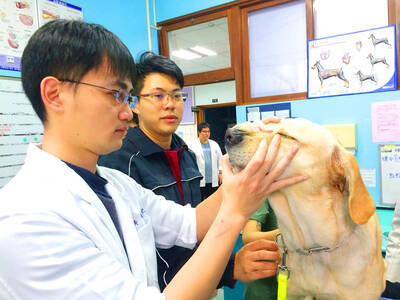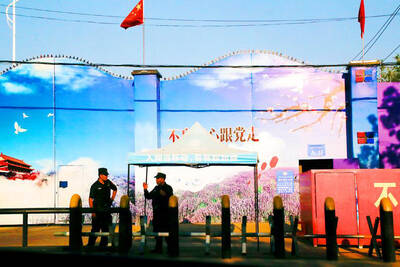High-school student Lin Yu-hsieh (林又頡) won a gold medal at the annual British Invention Show last week with a machine that allows coffee lovers to enjoy their coffee at the temperature they want, without sacrificing flavor.
The “temperature adjustable coffee cup” invented by Lin, who is studying machinery at Shin Min High School in Taichung, was favored by the jury in the Young Innovator of the Year, in the under-18 class.
In Taichung yesterday, Lin demonstrated how his innovative design works.
It is a coffee cup able to heat or chill the drink, he said.
Describing how he came up with the idea, Lin said he was in the habit of buying a cup of iced coffee for his coffee-loving mother at a convenience store every morning, but the melting ice cubes always diluted the taste of the coffee.
His desire to have his mother enjoy the coffee at her preferred temperature, without sacrifcing flavor, inspired him to create his prize-winning machine, Lin said.
Over a six-month period, Lin and his instructor Chen Tse-hsiung (陳澤雄), a professor at Tunghai University in Taichung, experimented with several designs without success, before eventually creating a flask equipped with a digital device that allows users to set their preferred temperature for their drink.
The British Invention Show was held in London from Oct. 23 to 26. The event, in its 19th year, drew 100 teams from 15 countries to compete for the awards.

Former Czech Republic-based Taiwanese researcher Cheng Yu-chin (鄭宇欽) has been sentenced to seven years in prison on espionage-related charges, China’s Ministry of State Security announced yesterday. China said Cheng was a spy for Taiwan who “masqueraded as a professor” and that he was previously an assistant to former Cabinet secretary-general Cho Jung-tai (卓榮泰). President-elect William Lai (賴清德) on Wednesday last week announced Cho would be his premier when Lai is inaugurated next month. Today is China’s “National Security Education Day.” The Chinese ministry yesterday released a video online showing arrests over the past 10 years of people alleged to be

THE HAWAII FACTOR: While a 1965 opinion said an attack on Hawaii would not trigger Article 5, the text of the treaty suggests the state is covered, the report says NATO could be drawn into a conflict in the Taiwan Strait if Chinese forces attacked the US mainland or Hawaii, a NATO Defense College report published on Monday says. The report, written by James Lee, an assistant research fellow at Academia Sinica’s Institute of European and American Studies, states that under certain conditions a Taiwan contingency could trigger Article 5 of NATO, under which an attack against any member of the alliance is considered an attack against all members, necessitating a response. Article 6 of the North Atlantic Treaty specifies that an armed attack in the territory of any member in Europe,

LIKE FAMILY: People now treat dogs and cats as family members. They receive the same medical treatments and tests as humans do, a veterinary association official said The number of pet dogs and cats in Taiwan has officially outnumbered the number of human newborns last year, data from the Ministry of Agriculture’s pet registration information system showed. As of last year, Taiwan had 94,544 registered pet dogs and 137,652 pet cats, the data showed. By contrast, 135,571 babies were born last year. Demand for medical care for pet animals has also risen. As of Feb. 29, there were 5,773 veterinarians in Taiwan, 3,993 of whom were for pet animals, statistics from the Animal and Plant Health Inspection Agency showed. In 2022, the nation had 3,077 pediatricians. As of last

XINJIANG: Officials are conducting a report into amending an existing law or to enact a special law to prohibit goods using forced labor Taiwan is mulling an amendment prohibiting the importation of goods using forced labor, similar to the Uyghur Forced Labor Prevention Act (UFLPA) passed by the US Congress in 2021 that imposed limits on goods produced using forced labor in China’s Xinjiang region. A government official who wished to remain anonymous said yesterday that as the US customs law explicitly prohibits the importation of goods made using forced labor, in 2021 it passed the specialized UFLPA to limit the importation of cotton and other goods from China’s Xinjiang Uyghur region. Taiwan does not have the legal basis to prohibit the importation of goods